
The Alys Robinson Stephens Performing Arts Center (ASC) is a performing arts facility located on the campus of the University of Alabama at Birmingham (UAB). It hosts over 250,000 people for more than 300 diverse events annually. The ASC is the center for entertainment and arts education in Birmingham and Central Alabama. The facility houses four performance venues, including the 1,330-seat Jemison Concert Hall, the 350-seat Sirote Theatre, the intimate 170-seat Reynolds-Kirschbaum Recital Hall, and the black-box Odess Theatre.
"Sometimes I'm Happy" is a popular song. The music was written by Vincent Youmans, the lyrics by Irving Caesar. The song was originally published in 1923 under the title "Come On And Pet Me," with lyrics by Oscar Hammerstein II and William Cary Duncan.
"I'm Beginning to See the Light" is a popular song and jazz standard, with music written by Duke Ellington, Johnny Hodges, and Harry James and lyrics by Don George and published in 1944.
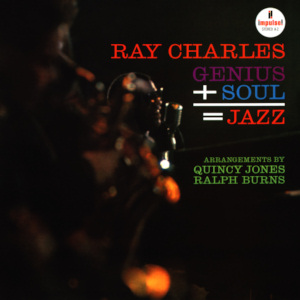
Genius + Soul = Jazz is a 1961 album by American musician Ray Charles, featuring big band arrangements by Quincy Jones and Ralph Burns. Charles is accompanied by two groups drawn from members of The Count Basie Band and from the ranks of top New York session players. It was recorded at Van Gelder Studio in two sessions on December 26 and 27, 1960 and originally released on the Impulse! label as Impulse! A–2.
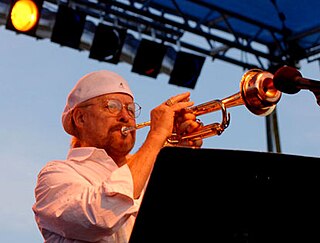
Dan Wright Jacobs is an American jazz trumpeter and flugelhorn player.
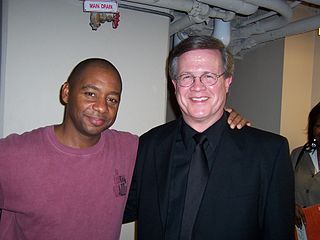
Raymond Everett Reach, Jr. is an American pianist, vocalist, guitarist, composer, arranger, music producer, and educator, named by AL.com as one of "30 Alabamians who changed jazz history." He serves as President and CEO of Ray Reach Music and Magic City Music Productions.
The Alabama Jazz Hall of Fame (AJHF) is an organization and museum in Birmingham, Alabama, United States. It was founded in 1978, and opened as museum on September 18, 1993, with a mission "to foster, encourage, educate, and cultivate a general appreciation of the medium of jazz music as a legitimate, original and distinctive art form indigenous to America. Its mission is also to preserve a continued and sustained program of illuminating the contribution of the State of Alabama through its citizens, environment, demographics and lore, and perpetuating the heritage of jazz music."

The Magic City Jazz Orchestra (MCJO) is an American jazz ensemble which was founded in 1999 as a spin-off of the SuperJazz Big Band by Birmingham, Alabama jazz pianist and vocalist Ray Reach. The mission of the group is to "...perform and record big band jazz music written by well known but under-recorded jazz artists."
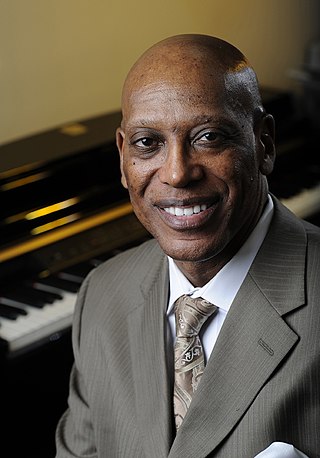
Henry Panion, III is an American composer, arranger, conductor, educator, and Professor in the Department of Music at the University of Alabama at Birmingham.
Steve Sample Sr. was a bandleader, arranger, composer and jazz educator. For more than 30 years, Sample was a professor in the Music Department of the University of Alabama, where he directed the Jazz Ensembles and taught music theory, arranging and jazz related courses. Sample trained many notable jazz musicians during his long tenure at Alabama, including Gary Wheat, Birch Johnson, Kelley O'Neal, Chris Gordon, Mervyn Warren, Cedric Dent, Beth Gottlieb, Mart Avant, Dick Aven and Ray Reach. He was respected by his peers as one of the finest jazz educators in the United States. On September 26, 2008, Sample was inducted into the Alabama Jazz Hall of Fame for his contributions to jazz education.
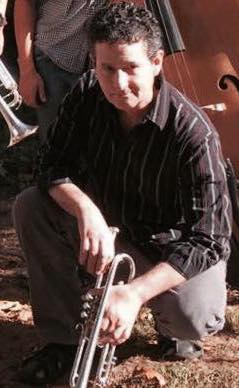
Ken Watters is an American jazz trumpeter residing in Huntsville, Alabama. He is the brother of noted jazz trombonist, Harry Watters. Ken has performed and/or recorded with Frank Sinatra, Tabou Combo,, Jason Isbell, Marc Anthony, Wyclef Jean, Natalie Cole, Mingus Big Band, Ray_Reach, Billy Ray Cyrus, Chris Potter Cee-Lo, Brad Mehldau, the Vanguard Orchestra, and a host of other luminaries of the music world. He attended the University of North Texas, where he participated in the famed Lab Band program and studied trumpet with internationally renowned teacher Leonard Candelaria. Later, Ken pursued further trumpet studies at Manhattan School of Music in New York City, where he also studied with Lew Soloff, Joe Lovano, Jack Walrath and Wynton Marsalis.
Neil McLean is an American saxophonist now residing in Tyler, Texas. As a member of the Henry Kimbrell Group, Ray Reach and Friends, the SuperJazz Big Band and the Magic City Jazz Orchestra, he worked with numerous notable performers, including Dionne Warwick, Ella Fitzgerald, Ernie Watts, Lou Marini, Ellis Marsalis and many others. For many years, while residing in Birmingham, Alabama, Neil established himself as one of the premier saxophonists in the Southeast. His arrangements for the SuperJazz Big Band are among the finest performed by that venerable ensemble.
The UAB Blazers men's basketball team represents the University of Alabama at Birmingham (UAB) in NCAA Division I men's college basketball, with the upcoming 2023–24 season being the Blazers' first as members of the American Athletic Conference.
"How Do You Keep the Music Playing?" is a song composed by Michel Legrand, with lyrics by Alan and Marilyn Bergman for the 1982 film Best Friends, where it was introduced by James Ingram and Patti Austin. The Austin/Ingram version became a single in 1983 and reached #45 on the Billboard Hot 100 and #5 on the Billboard Adult Contemporary chart. It was one of three songs with lyrics by Alan and Marilyn Bergman that were nominated for the Academy Award for Best Original Song at the 55th Academy Awards.

Lou's Blues is a big band jazz album by saxophonist Lou Marini and the Magic City Jazz Orchestra (MCJO) recorded at Bates Brothers Recording in Hueytown, Alabama. This CD was the first recording as a leader by Marini. Lou Marini is best known as a member of several noted bands, including Blood, Sweat and Tears, Steely Dan, the Woody Herman Orchestra, the Buddy Rich Band, The Maureen McGovern Band, the James Taylor Band, the Saturday Night Live Band, Aerosmith, Stevie Wonder and the Blues Brothers Band. Production duties for the album were shared by Lou Marini and Birmingham, Alabama based jazz musician Ray Reach.

Branford Marsalis is an American saxophonist, composer, and bandleader. While primarily known for his work in jazz as the leader of the Branford Marsalis Quartet, he also performs frequently as a soloist with classical ensembles and has led the group Buckshot LeFonque. From 1992 to 1995 he led the Tonight Show Band.
Raymond Harry "Ray" Brown is an American composer, arranger, trumpet player, and jazz educator. He has performed as trumpet player and arranged music for Stan Kenton, Bill Watrous, Bill Berry, Frank Capp – Nat Pierce, and the Full Faith and Credit Big Band.
In the 1990s in jazz, jazz rap continued progressing from the late 1980s and early 1990s, and incorporated jazz influence into hip hop. In 1988, Gang Starr released the debut single "Words I Manifest", sampling Dizzy Gillespie's 1962 "A Night in Tunisia", and Stetsasonic released "Talkin' All That Jazz", sampling Lonnie Liston Smith. Gang Starr's debut LP, No More Mr. Nice Guy, and their track "Jazz Thing" for the soundtrack of Mo' Better Blues, sampling Charlie Parker and Ramsey Lewis. Gang Starr also collaborated with Branford Marsalis and Terence Blanchard. Groups making up the collective known as the Native Tongues Posse tended towards jazzy releases; these include the Jungle Brothers' debut Straight Out the Jungle and A Tribe Called Quest's People's Instinctive Travels and the Paths of Rhythm and The Low End Theory.
In the 1990s and 2000s, a number of young musicians emerged, including US pianists Brad Mehldau, Jason Moran and Vijay Iyer, guitarist Kurt Rosenwinkel, vibraphonist Stefon Harris, trumpeters Roy Hargrove and Terence Blanchard, saxophonists Chris Potter and Joshua Redman, and bassist Christian McBride. Well-established jazz musicians, such as Dave Brubeck, Wynton Marsalis, Sonny Rollins, Wayne Shorter, Jessica Williams and George Benson, continue to perform and record.
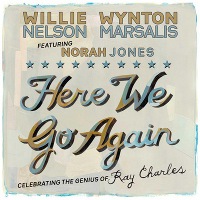
Here We Go Again: Celebrating the Genius of Ray Charles is a live tribute album by country singer Willie Nelson and jazz trumpeter Wynton Marsalis. It was recorded during concerts at the Rose Theater in New York City, on February 9 and 10, 2009. The album received mixed reviews, in which the instrumentation of Marsalis' orchestra was praised by the critics.










